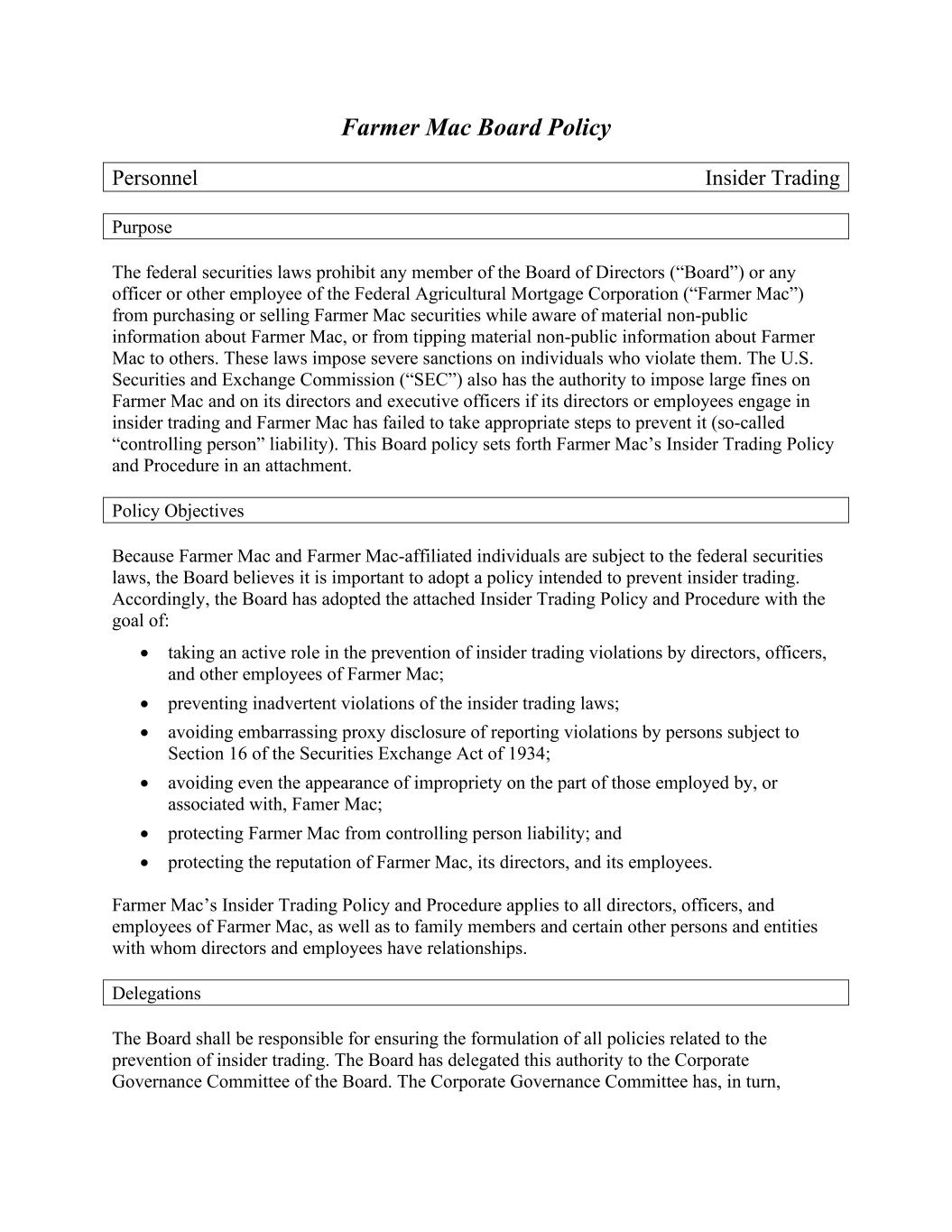
Farmer Mac Board Policy Personnel Insider Trading Purpose The federal securities laws prohibit any member of the Board of Directors (“Board”) or any officer or other employee of the Federal Agricultural Mortgage Corporation (“Farmer Mac”) from purchasing or selling Farmer Mac securities while aware of material non-public information about Farmer Mac, or from tipping material non-public information about Farmer Mac to others. These laws impose severe sanctions on individuals who violate them. The U.S. Securities and Exchange Commission (“SEC”) also has the authority to impose large fines on Farmer Mac and on its directors and executive officers if its directors or employees engage in insider trading and Farmer Mac has failed to take appropriate steps to prevent it (so-called “controlling person” liability). This Board policy sets forth Farmer Mac’s Insider Trading Policy and Procedure in an attachment. Policy Objectives Because Farmer Mac and Farmer Mac-affiliated individuals are subject to the federal securities laws, the Board believes it is important to adopt a policy intended to prevent insider trading. Accordingly, the Board has adopted the attached Insider Trading Policy and Procedure with the goal of: • taking an active role in the prevention of insider trading violations by directors, officers, and other employees of Farmer Mac; • preventing inadvertent violations of the insider trading laws; • avoiding embarrassing proxy disclosure of reporting violations by persons subject to Section 16 of the Securities Exchange Act of 1934; • avoiding even the appearance of impropriety on the part of those employed by, or associated with, Famer Mac; • protecting Farmer Mac from controlling person liability; and • protecting the reputation of Farmer Mac, its directors, and its employees. Farmer Mac’s Insider Trading Policy and Procedure applies to all directors, officers, and employees of Farmer Mac, as well as to family members and certain other persons and entities with whom directors and employees have relationships. Delegations The Board shall be responsible for ensuring the formulation of all policies related to the prevention of insider trading. The Board has delegated this authority to the Corporate Governance Committee of the Board. The Corporate Governance Committee has, in turn,
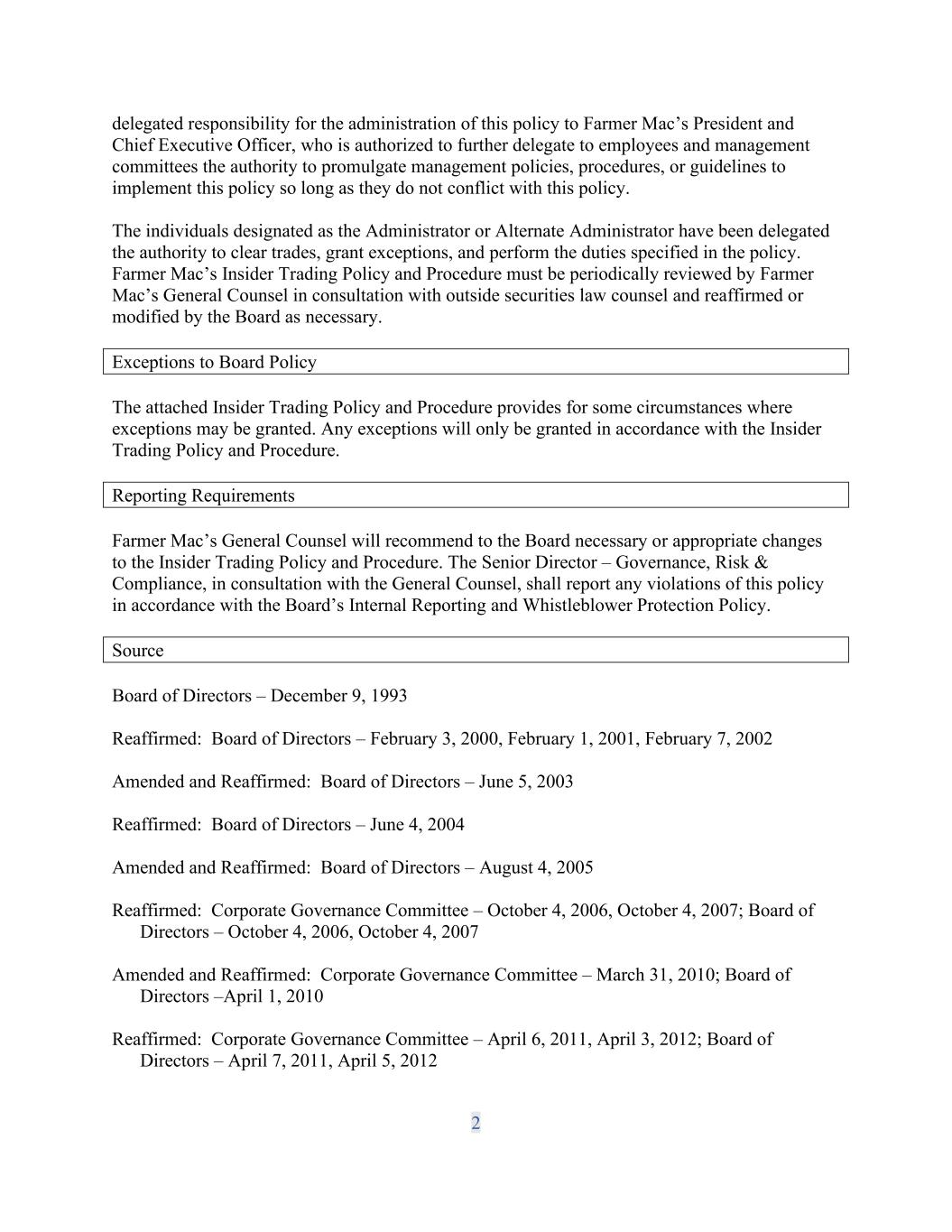
2 delegated responsibility for the administration of this policy to Farmer Mac’s President and Chief Executive Officer, who is authorized to further delegate to employees and management committees the authority to promulgate management policies, procedures, or guidelines to implement this policy so long as they do not conflict with this policy. The individuals designated as the Administrator or Alternate Administrator have been delegated the authority to clear trades, grant exceptions, and perform the duties specified in the policy. Farmer Mac’s Insider Trading Policy and Procedure must be periodically reviewed by Farmer Mac’s General Counsel in consultation with outside securities law counsel and reaffirmed or modified by the Board as necessary. Exceptions to Board Policy The attached Insider Trading Policy and Procedure provides for some circumstances where exceptions may be granted. Any exceptions will only be granted in accordance with the Insider Trading Policy and Procedure. Reporting Requirements Farmer Mac’s General Counsel will recommend to the Board necessary or appropriate changes to the Insider Trading Policy and Procedure. The Senior Director – Governance, Risk & Compliance, in consultation with the General Counsel, shall report any violations of this policy in accordance with the Board’s Internal Reporting and Whistleblower Protection Policy. Source Board of Directors – December 9, 1993 Reaffirmed: Board of Directors – February 3, 2000, February 1, 2001, February 7, 2002 Amended and Reaffirmed: Board of Directors – June 5, 2003 Reaffirmed: Board of Directors – June 4, 2004 Amended and Reaffirmed: Board of Directors – August 4, 2005 Reaffirmed: Corporate Governance Committee – October 4, 2006, October 4, 2007; Board of Directors – October 4, 2006, October 4, 2007 Amended and Reaffirmed: Corporate Governance Committee – March 31, 2010; Board of Directors –April 1, 2010 Reaffirmed: Corporate Governance Committee – April 6, 2011, April 3, 2012; Board of Directors – April 7, 2011, April 5, 2012
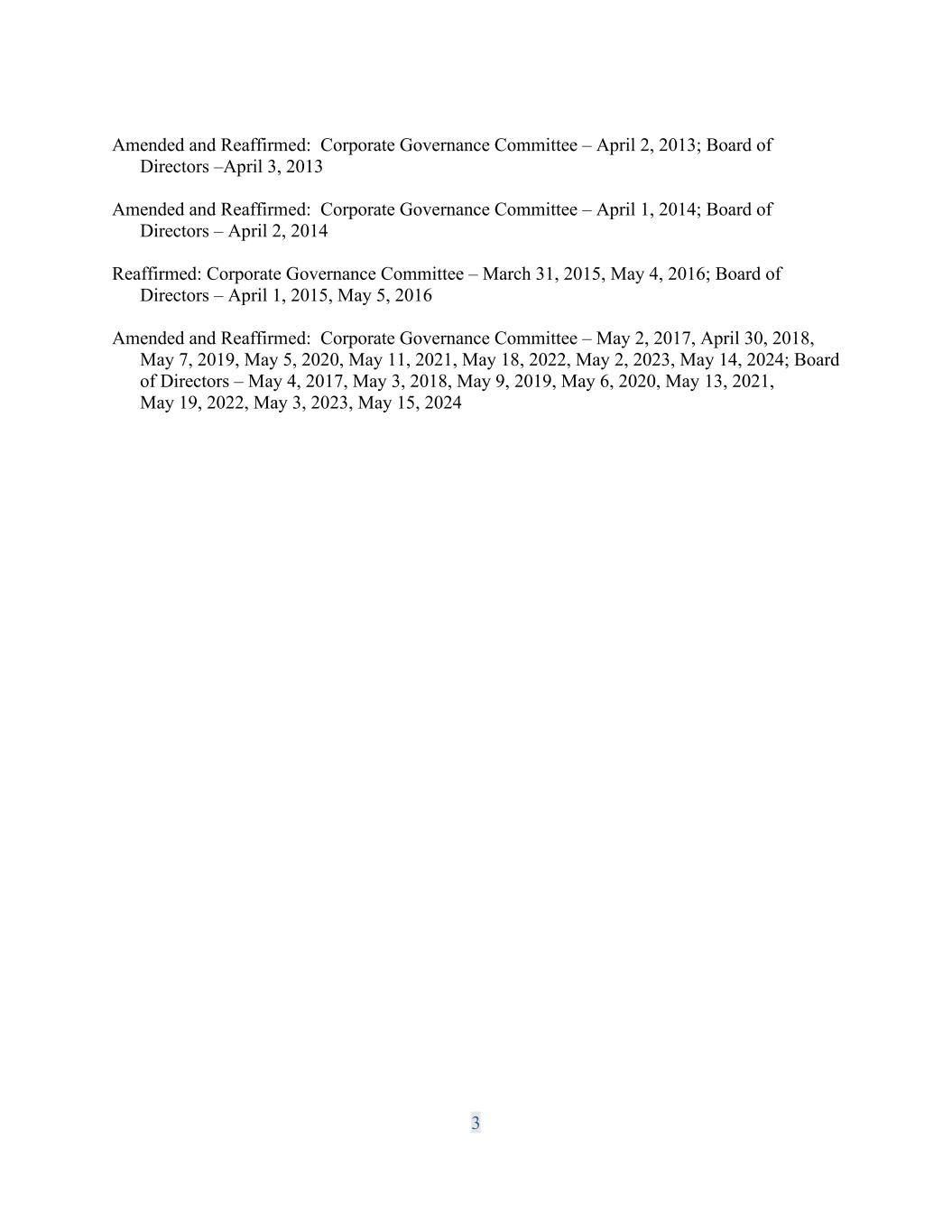
3 Amended and Reaffirmed: Corporate Governance Committee – April 2, 2013; Board of Directors –April 3, 2013 Amended and Reaffirmed: Corporate Governance Committee – April 1, 2014; Board of Directors – April 2, 2014 Reaffirmed: Corporate Governance Committee – March 31, 2015, May 4, 2016; Board of Directors – April 1, 2015, May 5, 2016 Amended and Reaffirmed: Corporate Governance Committee – May 2, 2017, April 30, 2018, May 7, 2019, May 5, 2020, May 11, 2021, May 18, 2022, May 2, 2023, May 14, 2024; Board of Directors – May 4, 2017, May 3, 2018, May 9, 2019, May 6, 2020, May 13, 2021, May 19, 2022, May 3, 2023, May 15, 2024
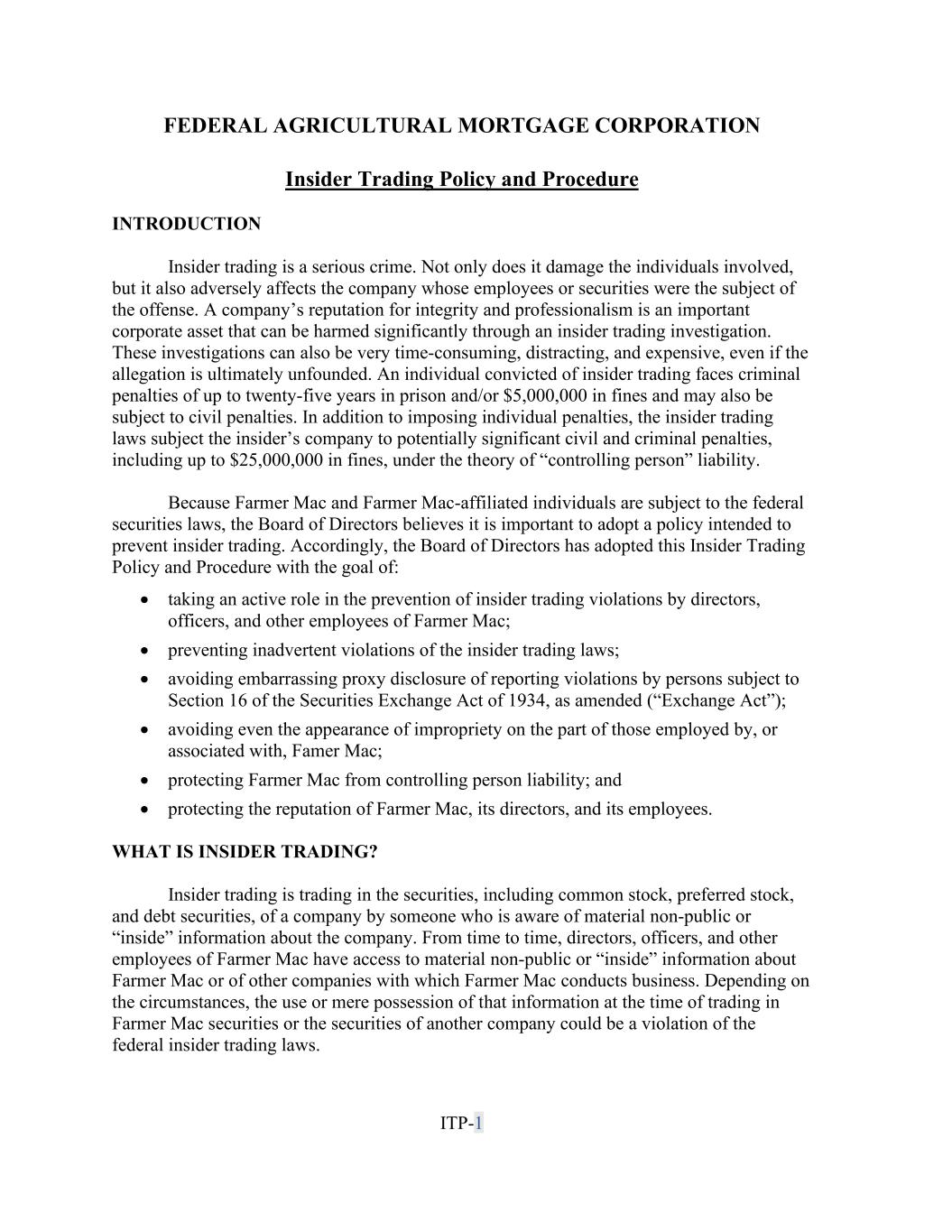
ITP-1 FEDERAL AGRICULTURAL MORTGAGE CORPORATION Insider Trading Policy and Procedure INTRODUCTION Insider trading is a serious crime. Not only does it damage the individuals involved, but it also adversely affects the company whose employees or securities were the subject of the offense. A company’s reputation for integrity and professionalism is an important corporate asset that can be harmed significantly through an insider trading investigation. These investigations can also be very time-consuming, distracting, and expensive, even if the allegation is ultimately unfounded. An individual convicted of insider trading faces criminal penalties of up to twenty-five years in prison and/or $5,000,000 in fines and may also be subject to civil penalties. In addition to imposing individual penalties, the insider trading laws subject the insider’s company to potentially significant civil and criminal penalties, including up to $25,000,000 in fines, under the theory of “controlling person” liability. Because Farmer Mac and Farmer Mac-affiliated individuals are subject to the federal securities laws, the Board of Directors believes it is important to adopt a policy intended to prevent insider trading. Accordingly, the Board of Directors has adopted this Insider Trading Policy and Procedure with the goal of: • taking an active role in the prevention of insider trading violations by directors, officers, and other employees of Farmer Mac; • preventing inadvertent violations of the insider trading laws; • avoiding embarrassing proxy disclosure of reporting violations by persons subject to Section 16 of the Securities Exchange Act of 1934, as amended (“Exchange Act”); • avoiding even the appearance of impropriety on the part of those employed by, or associated with, Famer Mac; • protecting Farmer Mac from controlling person liability; and • protecting the reputation of Farmer Mac, its directors, and its employees. WHAT IS INSIDER TRADING? Insider trading is trading in the securities, including common stock, preferred stock, and debt securities, of a company by someone who is aware of material non-public or “inside” information about the company. From time to time, directors, officers, and other employees of Farmer Mac have access to material non-public or “inside” information about Farmer Mac or of other companies with which Farmer Mac conducts business. Depending on the circumstances, the use or mere possession of that information at the time of trading in Farmer Mac securities or the securities of another company could be a violation of the federal insider trading laws.
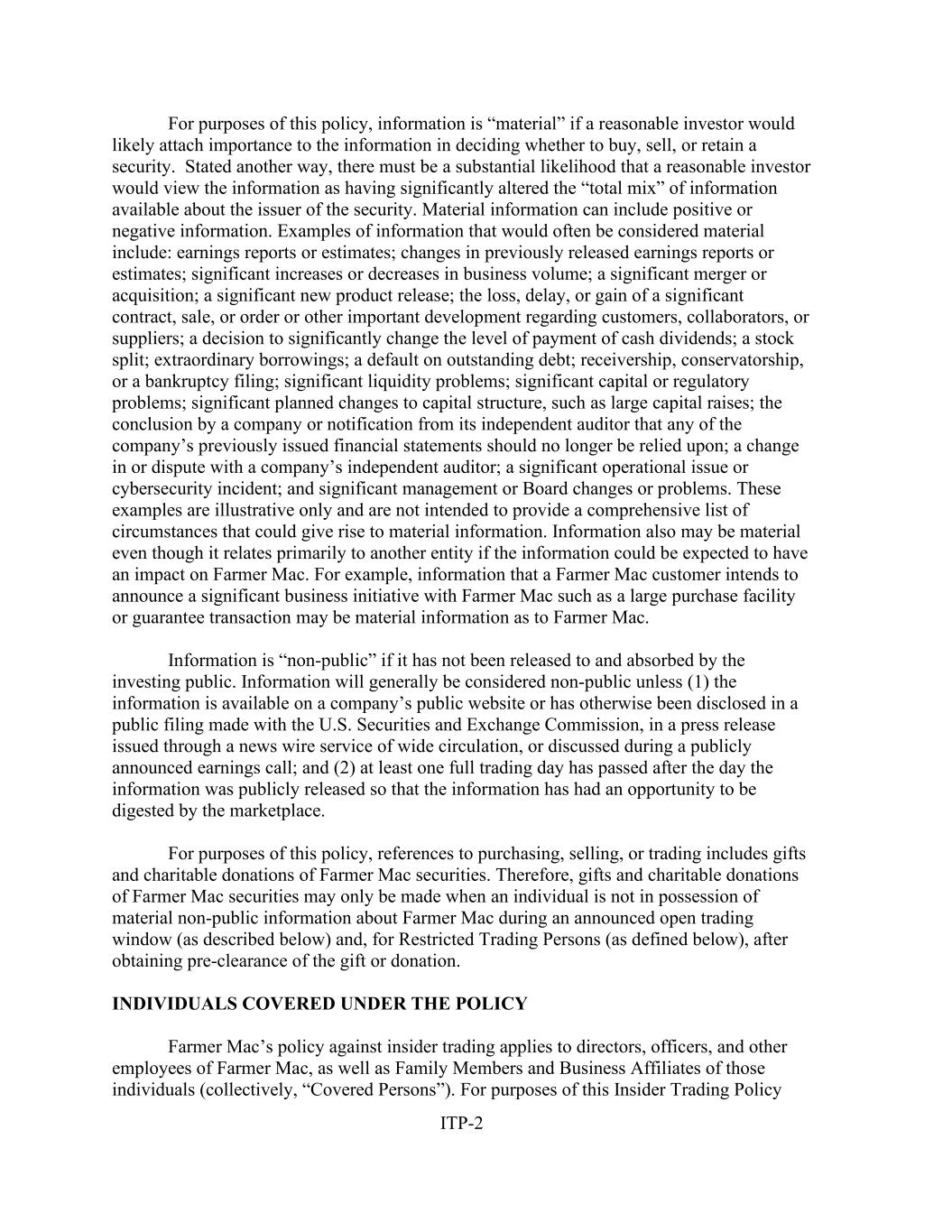
ITP-2 For purposes of this policy, information is “material” if a reasonable investor would likely attach importance to the information in deciding whether to buy, sell, or retain a security. Stated another way, there must be a substantial likelihood that a reasonable investor would view the information as having significantly altered the “total mix” of information available about the issuer of the security. Material information can include positive or negative information. Examples of information that would often be considered material include: earnings reports or estimates; changes in previously released earnings reports or estimates; significant increases or decreases in business volume; a significant merger or acquisition; a significant new product release; the loss, delay, or gain of a significant contract, sale, or order or other important development regarding customers, collaborators, or suppliers; a decision to significantly change the level of payment of cash dividends; a stock split; extraordinary borrowings; a default on outstanding debt; receivership, conservatorship, or a bankruptcy filing; significant liquidity problems; significant capital or regulatory problems; significant planned changes to capital structure, such as large capital raises; the conclusion by a company or notification from its independent auditor that any of the company’s previously issued financial statements should no longer be relied upon; a change in or dispute with a company’s independent auditor; a significant operational issue or cybersecurity incident; and significant management or Board changes or problems. These examples are illustrative only and are not intended to provide a comprehensive list of circumstances that could give rise to material information. Information also may be material even though it relates primarily to another entity if the information could be expected to have an impact on Farmer Mac. For example, information that a Farmer Mac customer intends to announce a significant business initiative with Farmer Mac such as a large purchase facility or guarantee transaction may be material information as to Farmer Mac. Information is “non-public” if it has not been released to and absorbed by the investing public. Information will generally be considered non-public unless (1) the information is available on a company’s public website or has otherwise been disclosed in a public filing made with the U.S. Securities and Exchange Commission, in a press release issued through a news wire service of wide circulation, or discussed during a publicly announced earnings call; and (2) at least one full trading day has passed after the day the information was publicly released so that the information has had an opportunity to be digested by the marketplace. For purposes of this policy, references to purchasing, selling, or trading includes gifts and charitable donations of Farmer Mac securities. Therefore, gifts and charitable donations of Farmer Mac securities may only be made when an individual is not in possession of material non-public information about Farmer Mac during an announced open trading window (as described below) and, for Restricted Trading Persons (as defined below), after obtaining pre-clearance of the gift or donation. INDIVIDUALS COVERED UNDER THE POLICY Farmer Mac’s policy against insider trading applies to directors, officers, and other employees of Farmer Mac, as well as Family Members and Business Affiliates of those individuals (collectively, “Covered Persons”). For purposes of this Insider Trading Policy
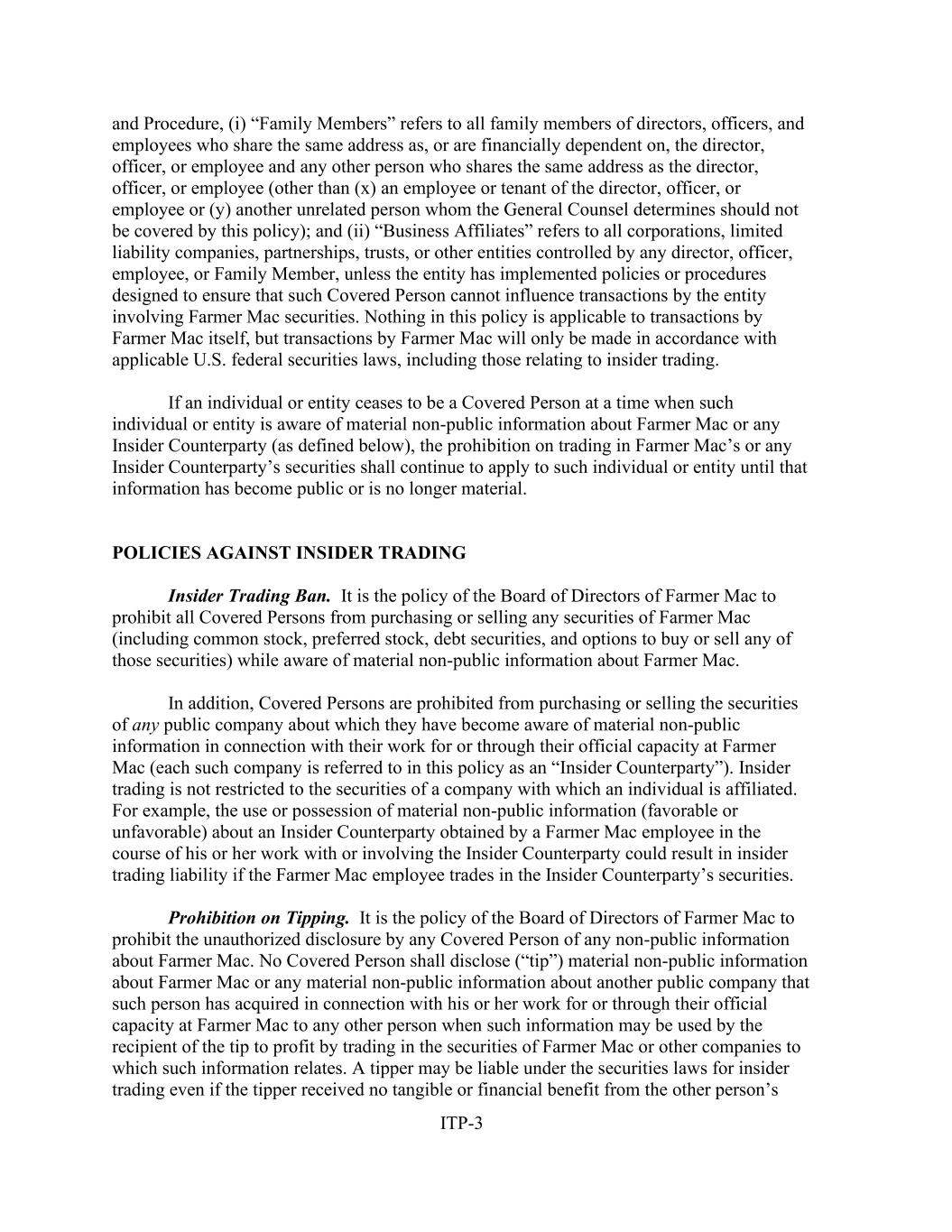
ITP-3 and Procedure, (i) “Family Members” refers to all family members of directors, officers, and employees who share the same address as, or are financially dependent on, the director, officer, or employee and any other person who shares the same address as the director, officer, or employee (other than (x) an employee or tenant of the director, officer, or employee or (y) another unrelated person whom the General Counsel determines should not be covered by this policy); and (ii) “Business Affiliates” refers to all corporations, limited liability companies, partnerships, trusts, or other entities controlled by any director, officer, employee, or Family Member, unless the entity has implemented policies or procedures designed to ensure that such Covered Person cannot influence transactions by the entity involving Farmer Mac securities. Nothing in this policy is applicable to transactions by Farmer Mac itself, but transactions by Farmer Mac will only be made in accordance with applicable U.S. federal securities laws, including those relating to insider trading. If an individual or entity ceases to be a Covered Person at a time when such individual or entity is aware of material non-public information about Farmer Mac or any Insider Counterparty (as defined below), the prohibition on trading in Farmer Mac’s or any Insider Counterparty’s securities shall continue to apply to such individual or entity until that information has become public or is no longer material. POLICIES AGAINST INSIDER TRADING Insider Trading Ban. It is the policy of the Board of Directors of Farmer Mac to prohibit all Covered Persons from purchasing or selling any securities of Farmer Mac (including common stock, preferred stock, debt securities, and options to buy or sell any of those securities) while aware of material non-public information about Farmer Mac. In addition, Covered Persons are prohibited from purchasing or selling the securities of any public company about which they have become aware of material non-public information in connection with their work for or through their official capacity at Farmer Mac (each such company is referred to in this policy as an “Insider Counterparty”). Insider trading is not restricted to the securities of a company with which an individual is affiliated. For example, the use or possession of material non-public information (favorable or unfavorable) about an Insider Counterparty obtained by a Farmer Mac employee in the course of his or her work with or involving the Insider Counterparty could result in insider trading liability if the Farmer Mac employee trades in the Insider Counterparty’s securities. Prohibition on Tipping. It is the policy of the Board of Directors of Farmer Mac to prohibit the unauthorized disclosure by any Covered Person of any non-public information about Farmer Mac. No Covered Person shall disclose (“tip”) material non-public information about Farmer Mac or any material non-public information about another public company that such person has acquired in connection with his or her work for or through their official capacity at Farmer Mac to any other person when such information may be used by the recipient of the tip to profit by trading in the securities of Farmer Mac or other companies to which such information relates. A tipper may be liable under the securities laws for insider trading even if the tipper received no tangible or financial benefit from the other person’s
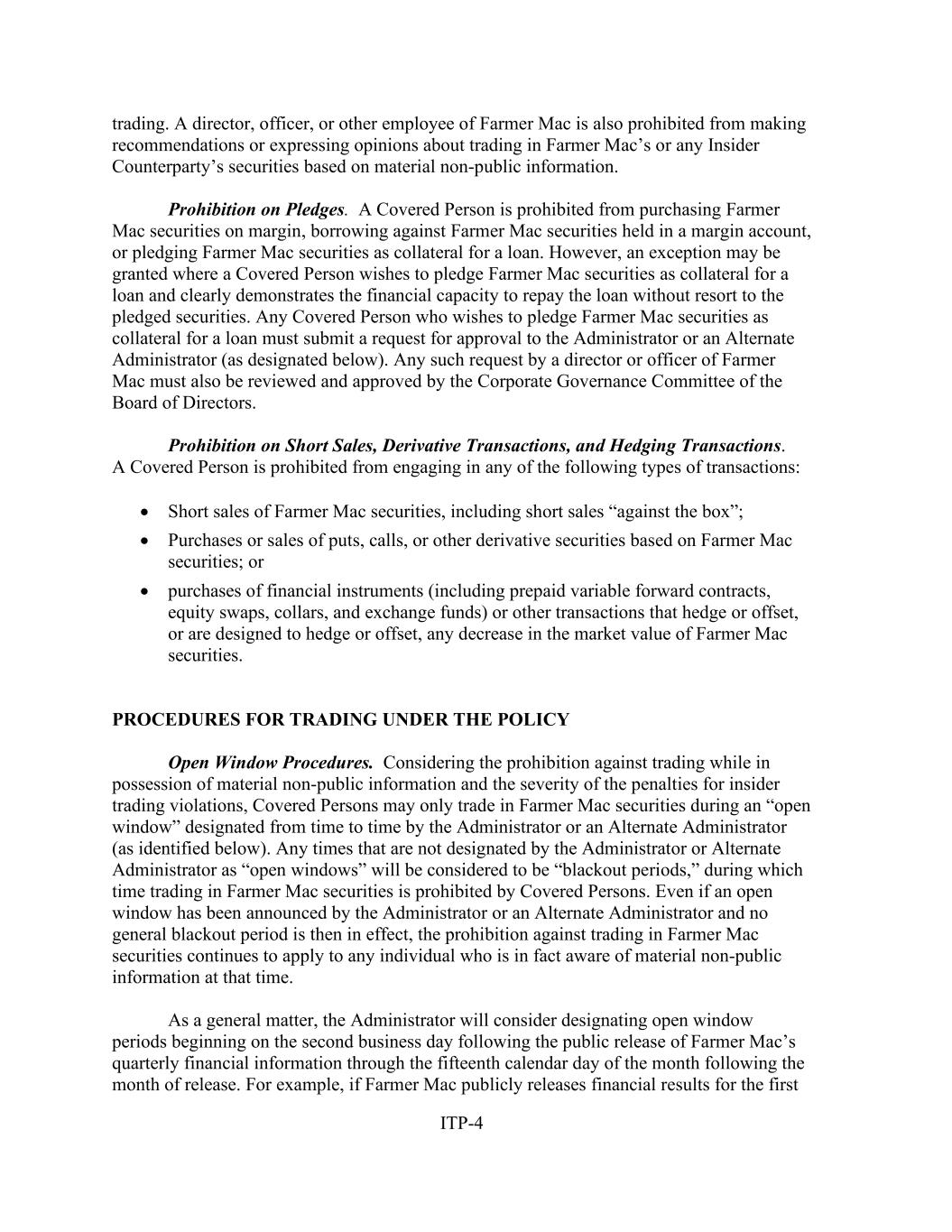
ITP-4 trading. A director, officer, or other employee of Farmer Mac is also prohibited from making recommendations or expressing opinions about trading in Farmer Mac’s or any Insider Counterparty’s securities based on material non-public information. Prohibition on Pledges. A Covered Person is prohibited from purchasing Farmer Mac securities on margin, borrowing against Farmer Mac securities held in a margin account, or pledging Farmer Mac securities as collateral for a loan. However, an exception may be granted where a Covered Person wishes to pledge Farmer Mac securities as collateral for a loan and clearly demonstrates the financial capacity to repay the loan without resort to the pledged securities. Any Covered Person who wishes to pledge Farmer Mac securities as collateral for a loan must submit a request for approval to the Administrator or an Alternate Administrator (as designated below). Any such request by a director or officer of Farmer Mac must also be reviewed and approved by the Corporate Governance Committee of the Board of Directors. Prohibition on Short Sales, Derivative Transactions, and Hedging Transactions. A Covered Person is prohibited from engaging in any of the following types of transactions: • Short sales of Farmer Mac securities, including short sales “against the box”; • Purchases or sales of puts, calls, or other derivative securities based on Farmer Mac securities; or • purchases of financial instruments (including prepaid variable forward contracts, equity swaps, collars, and exchange funds) or other transactions that hedge or offset, or are designed to hedge or offset, any decrease in the market value of Farmer Mac securities. PROCEDURES FOR TRADING UNDER THE POLICY Open Window Procedures. Considering the prohibition against trading while in possession of material non-public information and the severity of the penalties for insider trading violations, Covered Persons may only trade in Farmer Mac securities during an “open window” designated from time to time by the Administrator or an Alternate Administrator (as identified below). Any times that are not designated by the Administrator or Alternate Administrator as “open windows” will be considered to be “blackout periods,” during which time trading in Farmer Mac securities is prohibited by Covered Persons. Even if an open window has been announced by the Administrator or an Alternate Administrator and no general blackout period is then in effect, the prohibition against trading in Farmer Mac securities continues to apply to any individual who is in fact aware of material non-public information at that time. As a general matter, the Administrator will consider designating open window periods beginning on the second business day following the public release of Farmer Mac’s quarterly financial information through the fifteenth calendar day of the month following the month of release. For example, if Farmer Mac publicly releases financial results for the first
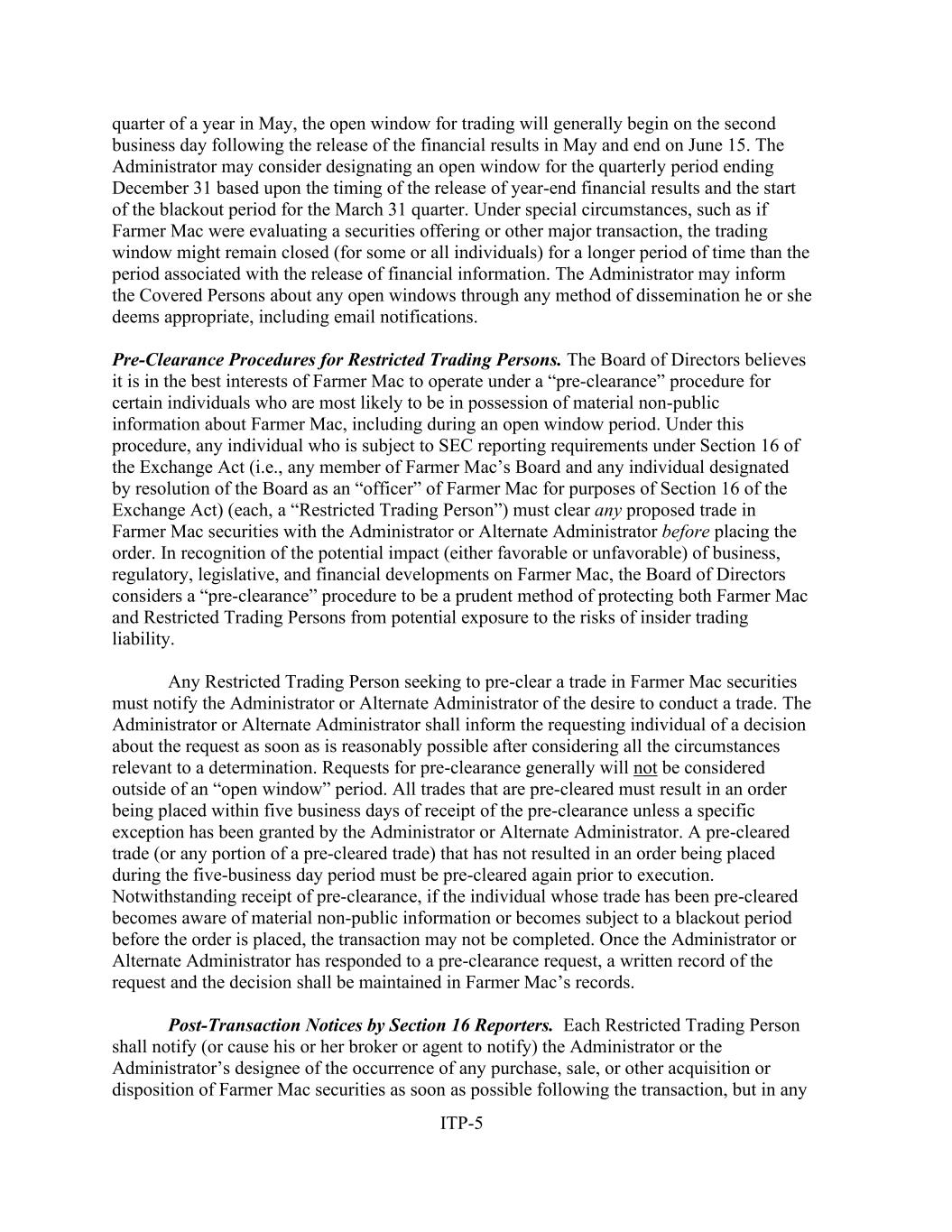
ITP-5 quarter of a year in May, the open window for trading will generally begin on the second business day following the release of the financial results in May and end on June 15. The Administrator may consider designating an open window for the quarterly period ending December 31 based upon the timing of the release of year-end financial results and the start of the blackout period for the March 31 quarter. Under special circumstances, such as if Farmer Mac were evaluating a securities offering or other major transaction, the trading window might remain closed (for some or all individuals) for a longer period of time than the period associated with the release of financial information. The Administrator may inform the Covered Persons about any open windows through any method of dissemination he or she deems appropriate, including email notifications. Pre-Clearance Procedures for Restricted Trading Persons. The Board of Directors believes it is in the best interests of Farmer Mac to operate under a “pre-clearance” procedure for certain individuals who are most likely to be in possession of material non-public information about Farmer Mac, including during an open window period. Under this procedure, any individual who is subject to SEC reporting requirements under Section 16 of the Exchange Act (i.e., any member of Farmer Mac’s Board and any individual designated by resolution of the Board as an “officer” of Farmer Mac for purposes of Section 16 of the Exchange Act) (each, a “Restricted Trading Person”) must clear any proposed trade in Farmer Mac securities with the Administrator or Alternate Administrator before placing the order. In recognition of the potential impact (either favorable or unfavorable) of business, regulatory, legislative, and financial developments on Farmer Mac, the Board of Directors considers a “pre-clearance” procedure to be a prudent method of protecting both Farmer Mac and Restricted Trading Persons from potential exposure to the risks of insider trading liability. Any Restricted Trading Person seeking to pre-clear a trade in Farmer Mac securities must notify the Administrator or Alternate Administrator of the desire to conduct a trade. The Administrator or Alternate Administrator shall inform the requesting individual of a decision about the request as soon as is reasonably possible after considering all the circumstances relevant to a determination. Requests for pre-clearance generally will not be considered outside of an “open window” period. All trades that are pre-cleared must result in an order being placed within five business days of receipt of the pre-clearance unless a specific exception has been granted by the Administrator or Alternate Administrator. A pre-cleared trade (or any portion of a pre-cleared trade) that has not resulted in an order being placed during the five-business day period must be pre-cleared again prior to execution. Notwithstanding receipt of pre-clearance, if the individual whose trade has been pre-cleared becomes aware of material non-public information or becomes subject to a blackout period before the order is placed, the transaction may not be completed. Once the Administrator or Alternate Administrator has responded to a pre-clearance request, a written record of the request and the decision shall be maintained in Farmer Mac’s records. Post-Transaction Notices by Section 16 Reporters. Each Restricted Trading Person shall notify (or cause his or her broker or agent to notify) the Administrator or the Administrator’s designee of the occurrence of any purchase, sale, or other acquisition or disposition of Farmer Mac securities as soon as possible following the transaction, but in any
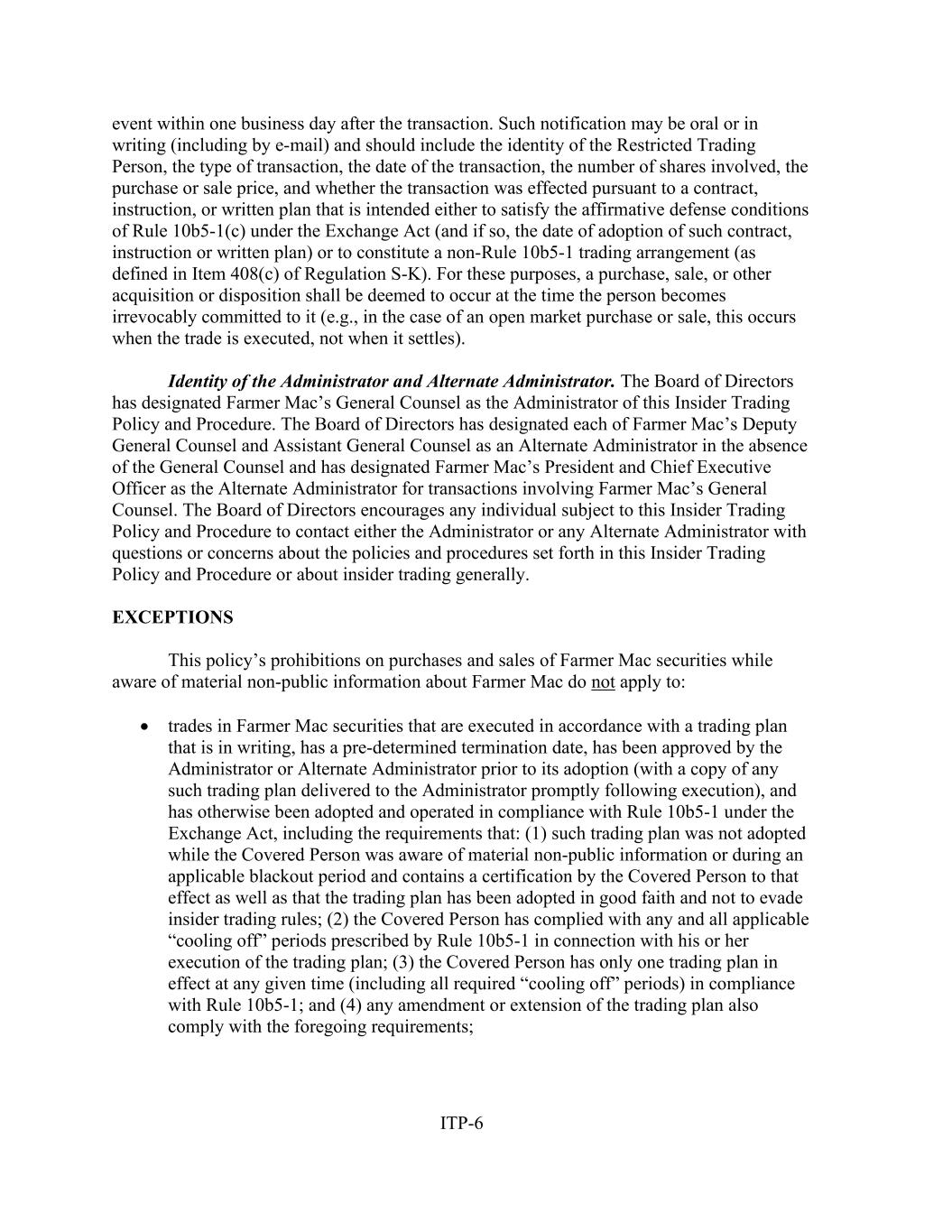
ITP-6 event within one business day after the transaction. Such notification may be oral or in writing (including by e-mail) and should include the identity of the Restricted Trading Person, the type of transaction, the date of the transaction, the number of shares involved, the purchase or sale price, and whether the transaction was effected pursuant to a contract, instruction, or written plan that is intended either to satisfy the affirmative defense conditions of Rule 10b5-1(c) under the Exchange Act (and if so, the date of adoption of such contract, instruction or written plan) or to constitute a non-Rule 10b5-1 trading arrangement (as defined in Item 408(c) of Regulation S-K). For these purposes, a purchase, sale, or other acquisition or disposition shall be deemed to occur at the time the person becomes irrevocably committed to it (e.g., in the case of an open market purchase or sale, this occurs when the trade is executed, not when it settles). Identity of the Administrator and Alternate Administrator. The Board of Directors has designated Farmer Mac’s General Counsel as the Administrator of this Insider Trading Policy and Procedure. The Board of Directors has designated each of Farmer Mac’s Deputy General Counsel and Assistant General Counsel as an Alternate Administrator in the absence of the General Counsel and has designated Farmer Mac’s President and Chief Executive Officer as the Alternate Administrator for transactions involving Farmer Mac’s General Counsel. The Board of Directors encourages any individual subject to this Insider Trading Policy and Procedure to contact either the Administrator or any Alternate Administrator with questions or concerns about the policies and procedures set forth in this Insider Trading Policy and Procedure or about insider trading generally. EXCEPTIONS This policy’s prohibitions on purchases and sales of Farmer Mac securities while aware of material non-public information about Farmer Mac do not apply to: • trades in Farmer Mac securities that are executed in accordance with a trading plan that is in writing, has a pre-determined termination date, has been approved by the Administrator or Alternate Administrator prior to its adoption (with a copy of any such trading plan delivered to the Administrator promptly following execution), and has otherwise been adopted and operated in compliance with Rule 10b5-1 under the Exchange Act, including the requirements that: (1) such trading plan was not adopted while the Covered Person was aware of material non-public information or during an applicable blackout period and contains a certification by the Covered Person to that effect as well as that the trading plan has been adopted in good faith and not to evade insider trading rules; (2) the Covered Person has complied with any and all applicable “cooling off” periods prescribed by Rule 10b5-1 in connection with his or her execution of the trading plan; (3) the Covered Person has only one trading plan in effect at any given time (including all required “cooling off” periods) in compliance with Rule 10b5-1; and (4) any amendment or extension of the trading plan also comply with the foregoing requirements;
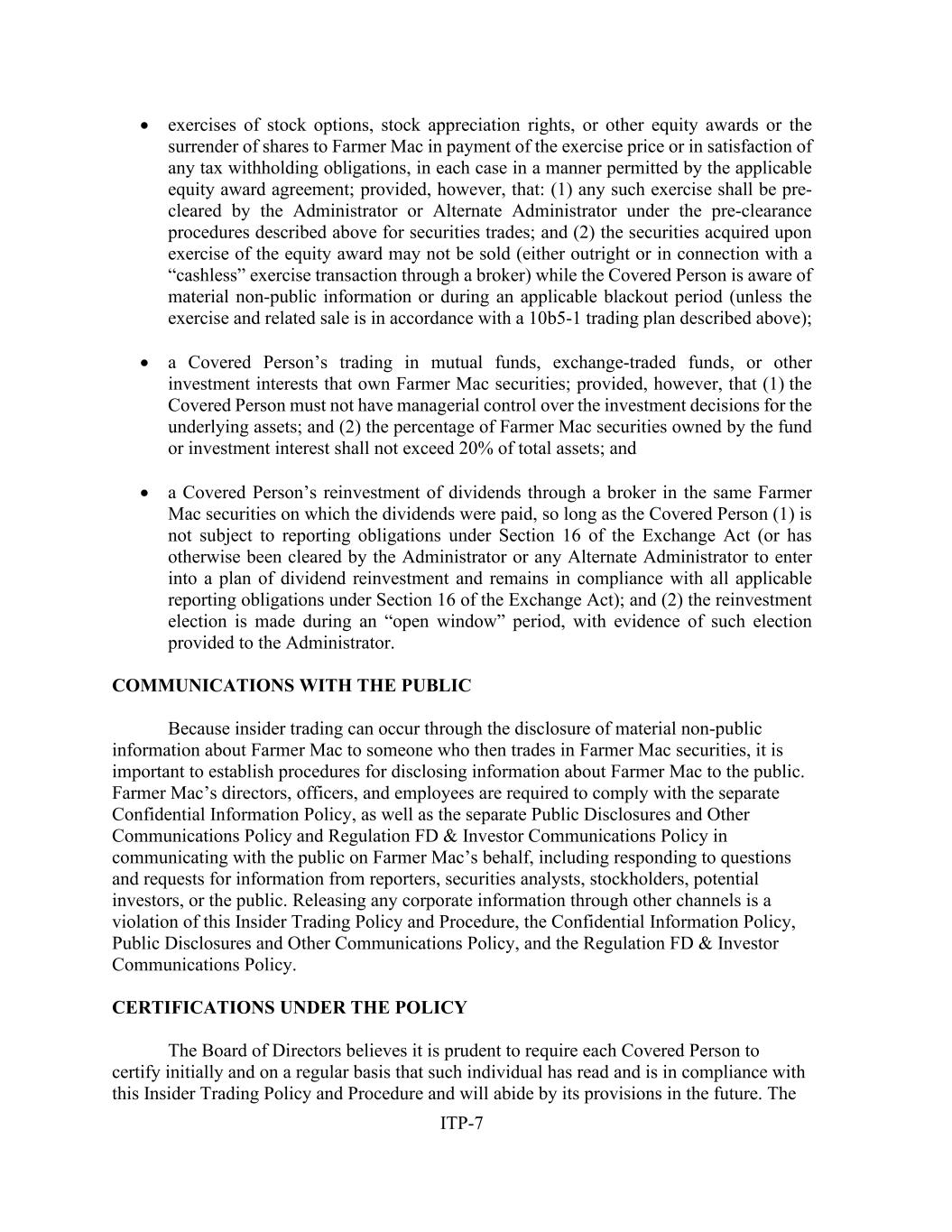
ITP-7 • exercises of stock options, stock appreciation rights, or other equity awards or the surrender of shares to Farmer Mac in payment of the exercise price or in satisfaction of any tax withholding obligations, in each case in a manner permitted by the applicable equity award agreement; provided, however, that: (1) any such exercise shall be pre- cleared by the Administrator or Alternate Administrator under the pre-clearance procedures described above for securities trades; and (2) the securities acquired upon exercise of the equity award may not be sold (either outright or in connection with a “cashless” exercise transaction through a broker) while the Covered Person is aware of material non-public information or during an applicable blackout period (unless the exercise and related sale is in accordance with a 10b5-1 trading plan described above); • a Covered Person’s trading in mutual funds, exchange-traded funds, or other investment interests that own Farmer Mac securities; provided, however, that (1) the Covered Person must not have managerial control over the investment decisions for the underlying assets; and (2) the percentage of Farmer Mac securities owned by the fund or investment interest shall not exceed 20% of total assets; and • a Covered Person’s reinvestment of dividends through a broker in the same Farmer Mac securities on which the dividends were paid, so long as the Covered Person (1) is not subject to reporting obligations under Section 16 of the Exchange Act (or has otherwise been cleared by the Administrator or any Alternate Administrator to enter into a plan of dividend reinvestment and remains in compliance with all applicable reporting obligations under Section 16 of the Exchange Act); and (2) the reinvestment election is made during an “open window” period, with evidence of such election provided to the Administrator. COMMUNICATIONS WITH THE PUBLIC Because insider trading can occur through the disclosure of material non-public information about Farmer Mac to someone who then trades in Farmer Mac securities, it is important to establish procedures for disclosing information about Farmer Mac to the public. Farmer Mac’s directors, officers, and employees are required to comply with the separate Confidential Information Policy, as well as the separate Public Disclosures and Other Communications Policy and Regulation FD & Investor Communications Policy in communicating with the public on Farmer Mac’s behalf, including responding to questions and requests for information from reporters, securities analysts, stockholders, potential investors, or the public. Releasing any corporate information through other channels is a violation of this Insider Trading Policy and Procedure, the Confidential Information Policy, Public Disclosures and Other Communications Policy, and the Regulation FD & Investor Communications Policy. CERTIFICATIONS UNDER THE POLICY The Board of Directors believes it is prudent to require each Covered Person to certify initially and on a regular basis that such individual has read and is in compliance with this Insider Trading Policy and Procedure and will abide by its provisions in the future. The
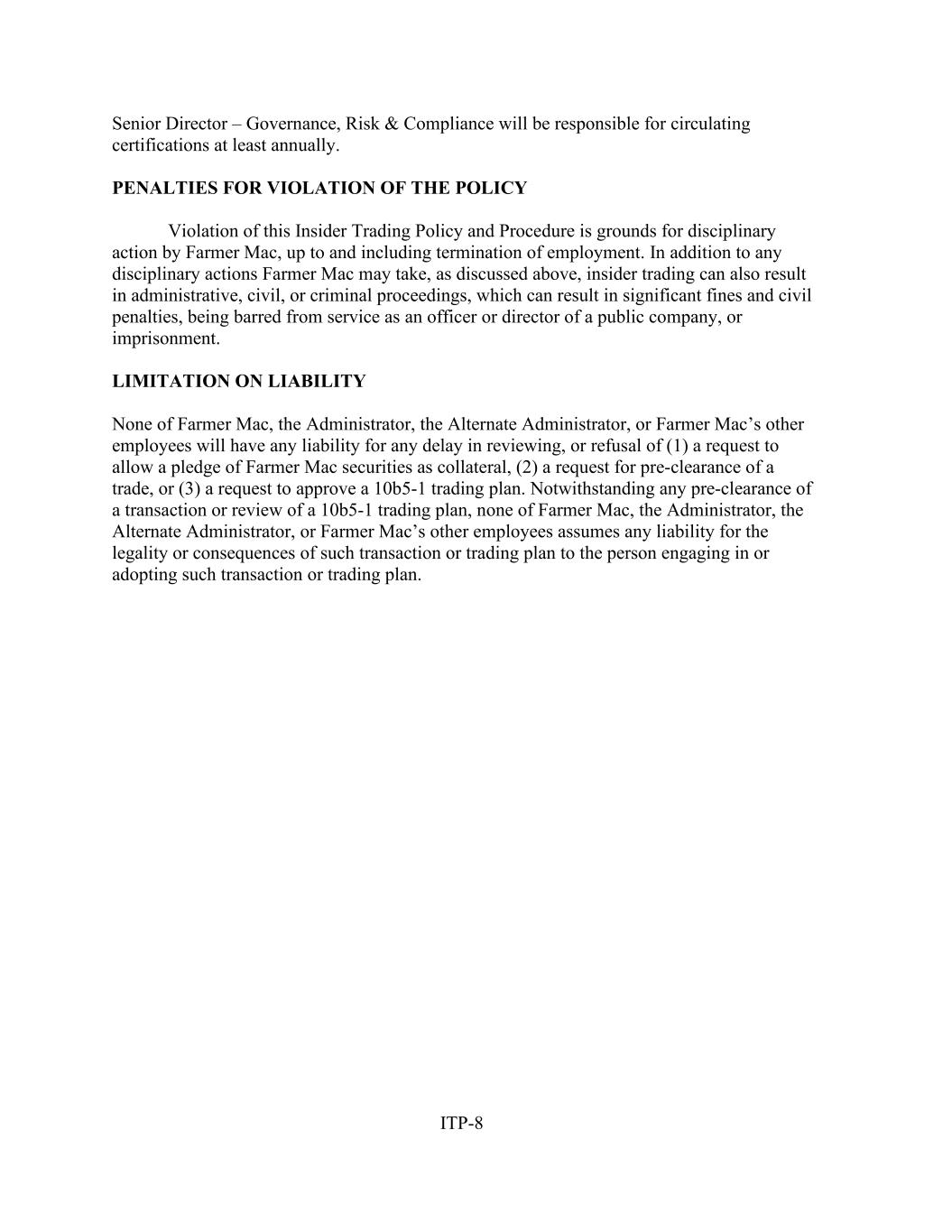
ITP-8 Senior Director – Governance, Risk & Compliance will be responsible for circulating certifications at least annually. PENALTIES FOR VIOLATION OF THE POLICY Violation of this Insider Trading Policy and Procedure is grounds for disciplinary action by Farmer Mac, up to and including termination of employment. In addition to any disciplinary actions Farmer Mac may take, as discussed above, insider trading can also result in administrative, civil, or criminal proceedings, which can result in significant fines and civil penalties, being barred from service as an officer or director of a public company, or imprisonment. LIMITATION ON LIABILITY None of Farmer Mac, the Administrator, the Alternate Administrator, or Farmer Mac’s other employees will have any liability for any delay in reviewing, or refusal of (1) a request to allow a pledge of Farmer Mac securities as collateral, (2) a request for pre-clearance of a trade, or (3) a request to approve a 10b5-1 trading plan. Notwithstanding any pre-clearance of a transaction or review of a 10b5-1 trading plan, none of Farmer Mac, the Administrator, the Alternate Administrator, or Farmer Mac’s other employees assumes any liability for the legality or consequences of such transaction or trading plan to the person engaging in or adopting such transaction or trading plan.










